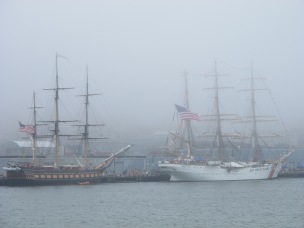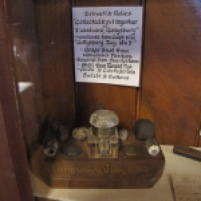 Peaks Island is 740 acres of real estate plopped down in Casco Bay, about three miles from downtown Portland. At one time during the late nineteenth and early twentieth centuries it was a tourist magnet, with amusement parks and attractions that earned it the nickname of “The Coney Island of Maine.” It’s a little quieter now, but the island still has its attractions, especially if you are interested in the Civil War. For there are not one but two Civil War museums on the island, one for the 5th Maine Volunteer Infantry and the other for the 8th Maine. Each is housed in a big building that the regiment’s veterans constructed on the island to provide a summer retreat for its soldiers.
Peaks Island is 740 acres of real estate plopped down in Casco Bay, about three miles from downtown Portland. At one time during the late nineteenth and early twentieth centuries it was a tourist magnet, with amusement parks and attractions that earned it the nickname of “The Coney Island of Maine.” It’s a little quieter now, but the island still has its attractions, especially if you are interested in the Civil War. For there are not one but two Civil War museums on the island, one for the 5th Maine Volunteer Infantry and the other for the 8th Maine. Each is housed in a big building that the regiment’s veterans constructed on the island to provide a summer retreat for its soldiers.
 Of the two, I am more interested in the 5th Maine Volunteer Infantry. This is one of the regiments I write about in my book, Maine Roads to Gettysburg. It was mustered in on June 24, 1861, and was fighting at First Bull Run, as part of the brigade of Oliver O. Howard, less than a month later. Truth be told, it did not fight particularly well in that battle, which was a debacle for the Union forces. George Dyer of Calais was in Washington, working as assistant quartermaster general for Maine, and he wrote home to Gov. Israel Washburn after the battle. “The 5th it is said broke and ran badly, he reported. “Scattered and many are prisoners.”
Of the two, I am more interested in the 5th Maine Volunteer Infantry. This is one of the regiments I write about in my book, Maine Roads to Gettysburg. It was mustered in on June 24, 1861, and was fighting at First Bull Run, as part of the brigade of Oliver O. Howard, less than a month later. Truth be told, it did not fight particularly well in that battle, which was a debacle for the Union forces. George Dyer of Calais was in Washington, working as assistant quartermaster general for Maine, and he wrote home to Gov. Israel Washburn after the battle. “The 5th it is said broke and ran badly, he reported. “Scattered and many are prisoners.”

The Fifth Maine’s Regimental Flag.
Under a new commander, Col. Nathaniel Jackson (“Old Jacks”), the regiment improved. It fought well on the Peninsula and at South Mountain, although it reached the battlefield at Antietam after the fighting there had ended. It fought at Fredericksburg and at Chancellorsville as part of the VI Corps, and also participated in that corps’ epic march to Gettysburg, arriving in time to bolster the Union line on July 2 but largely spared from serious fighting. The regiment remained with the army through the initial stages of the bloody Overland Campaign in 1864, but was mustered out after it reached the North Anna River.
The war over, the regiment’s veterans commissioned the construction of a large summer residence on Peaks Island. It opened in 1888 with 15 rooms that the veterans could rent, plus a large central hall and a spacious porch. This is the maine reason my wife and I are heading out to visit the island on a foggy and misty summer day. We take the car ferry from Portland’s Old Port District, for the bargain price of only $7 per round-trip ticket. We find a bustling scene at the ferry terminal, as cars line up to board the vessel and a long line of pedestrians waits their turn. We finally begin to file aboard the ferry, which casts off and heads out into the bay. Behind us we can see two Tall Ships moored to one of Portland’s docks. They soon disappear in the mist.
It’s not a long ride to the island, and once ashore we find that it’s not that long of a walk to find the 5th Maine’s museum. It’s big, yellow, wooden building with a distinctive turret in the back overlooking the ocean. A friendly docent greets us at the door and fills us in on the building’s history. Today the structure houses a small museum with a number of interesting relics. Stained glass windows in the spacious main hall contain the names of 5th Maine soldiers. Glass cases along the walls include relics recovered from various battlefields. In a back room, there’s a regimental flag, plus a glass case that holds the coat and hat worn by regimental adjutant George Bicknell, who wrote a history of the regiment after the war. A shell fragment wounded Bicknell in the head at Fredericksburg during the Chancellorsville campaign; you can see the rip in the kepi inside the glass case.
I don’t write about the 8th Maine in the book. It was not part of the Army of the Potomac and did not fight at Gettysburg, heading south to South Carolina and Florida instead. As part of the Army of the James, it took part in the Petersburg campaign and in the pursuit of the Army of Northern Virginia to Appomattox. The 8th Maine Regiment Lodge and Museum is just a stone’s throw away from the 5th Regiment’s lodge, housed inside a similar large summer house. It doesn’t have as many relics, but it does offer rooms that visitors can rent. Peaks Island might not be the Coney Island of Maine anymore, but it does provide some Civil War history in a place where you might not expect it. That makes it well worth the trip.












